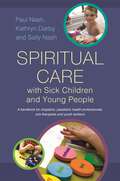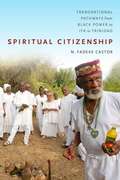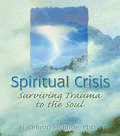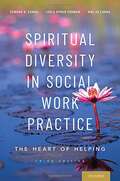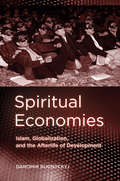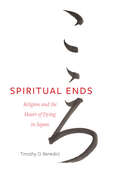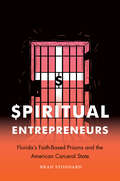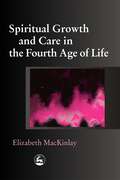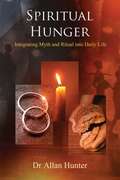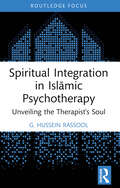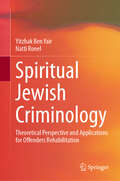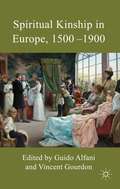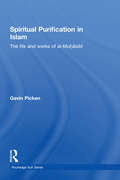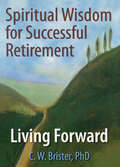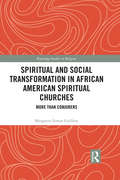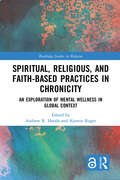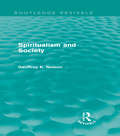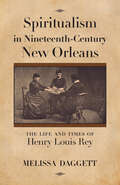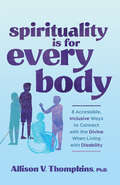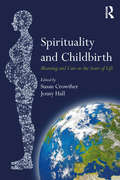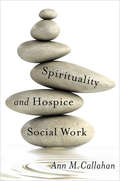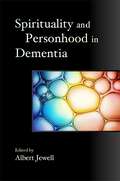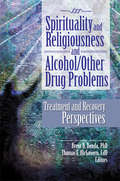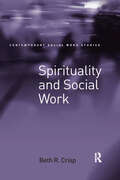- Table View
- List View
Spiritual Care with Sick Children and Young People: A handbook for chaplains, paediatric health professionals, arts therapists and youth workers
by Paul Nash Sally Nash Kathryn DarbyExploring both principles and best practice of the spiritual care of sick children and young people, this remarkable and inspiring book equips the reader to think critically and creatively about how to provide care in hospitals, hospices and other care contexts for ill and disabled children. Written for staff from any allied health discipline, the authors explore the potential spiritual needs and issues faced by sick children and young people. They provide evidence-based practice principles, and a range of activity-based interactions that empower the child or young person and expand discussion of meaning and identity. The book includes stories and multidisciplinary practice examples, as well as many ideas; practical activities; discussion of work with families, and also of the various tensions and issues that can emerge. Based on evidence-based practice and research carried out by the Chaplaincy Team at Birmingham Children's Hospital, the book will be helpful and inspiring reading for chaplains, nurses, play and youth workers, therapists and anyone else involved in the care of sick children and young people.
Spiritual Citizenship: Transnational Pathways from Black Power to Ifá in Trinidad
by N. Fadeke CastorIn Spiritual Citizenship N. Fadeke Castor employs the titular concept to illuminate how Ifá/Orisha practices informed by Yoruba cosmology shape local, national, and transnational belonging in African diasporic communities in Trinidad and beyond. Drawing on almost two decades of fieldwork in Trinidad, Castor outlines how the political activism and social upheaval of the 1970s set the stage for African diasporic religions to enter mainstream Trinidadian society. She establishes how the postcolonial performance of Ifá/Orisha practices in Trinidad fosters a sense of belonging that invigorates its practitioners to work toward freedom, equality, and social justice. Demonstrating how spirituality is inextricable from the political project of black liberation, Castor illustrates the ways in which Ifá/Orisha beliefs and practices offer Trinidadians the means to strengthen belonging throughout the diaspora, access past generations, heal historical wounds, and envision a decolonial future.
Spiritual Crisis: Surviving Trauma to the Soul
by J Lebron McbrideIt’s no revelation that in today’s world many people suffer from some form of spiritual crisis. But, fortunately, there is hope. In Spiritual Crisis: Surviving Trauma to the Soul, you’ll discover how you can reverse the impact of spiritual crisis and apply healing balm to the traumatized soul. A comprehensive, real-life approach to spiritual care, it gives you the understanding necessary to put a lid on the daily chaos that seeks to destroy those whose lives have been shattered by tragedy, terror, and disillusionment.Written from the perspective of a compassionate professional who has navigated the dark and turbulent waters of his own spiritual crises, Spiritual Crisis represents a loving cross-section of aid from the fields of pastoral theology, psychology, and health care. Christians and non-Christians alike will benefit from its frank approach to aiding troubled souls through the tough times of belief transition, loss of faith, and potentially damaging extremes in living and thinking. Specifically, you’ll read about: understanding the effects and roots of spiritual crisis and trauma coping with loss counteracting disillusionment with the church negotiating belief transitions dealing with religious burnout intervening in denominational identity crisesOftentimes, it’s hard to know what will make a loved one survive or succumb to the impact of seemingly insurmountable personal emergencies. However, this book is a “call to care” that will enable you to help others turn back the tide of debilitating hardship in their lives and restore the tempering unity of mind and body. Whether you’re a beginning pastoral counselor, a marriage and family therapist, or friend of a troubled loved one, Spiritual Crisis will show you and those you work with how to turn crisis into care.
Spiritual Dimensions of Ageing
by Malcolm Johnson Joanna WalkerOur understandings of both ageing and spirituality are changing rapidly in the twenty-first century, and grasping the significance of later life spirituality is now crucial in the context of extended longevity. Spiritual Dimensions of Ageing will inform and engage those who study or practise in all fields that relate to the lives of older people, especially in social, psychological and health-related domains, but also wherever the maintenance and development of spiritual meaning and purpose are recognised as important for human flourishing. Bringing together an international group of leading scholars across the fields of psychology, theology, history, philosophy, sociology and gerontology, the volume distils the latest advances in research on spirituality and ageing, and engages in vigorous discussion about how we can interpret this learning for the benefit of older people and those who seek to serve and support them.
Spiritual Diversity In Social Work Practice: The Heart Of Helping
by Edward R. Canda Leola Dyrud Furman Hwi-Ja CandaSocial workers and helping professionals serve many people who draw upon religion and spirituality to find meaning, thrive, and overcome oppression and obstacles in their lives. The third edition of Spiritual Diversity in Social Work Practice provides a comprehensive framework of values, knowledge, and skills for spiritually sensitive and culturally appropriate practice with diverse religious and non-religious clients. This classic text contains forty different case examples and stories that vividly illustrate the professional values and ethical principles that guide spiritually sensitive practice. Learning activities at the end of each chapter encourage readers' personal and professional development through self-reflection, dialogue, creative expression, outreach to the community, and skill application. The book also draws connections between spiritual and cultural diversity, gender, and LGBTQI issues. It introduces beliefs, values, and social welfare applications of Buddhism, Christianity, Confucianism, Hinduism, Indigenous spiritual perspectives, Islam, Judaism, Existentialism, and Transpersonal and Deep Ecological Theories. Skills for spiritual assessment and spiritually sensitive practices include mindfulness, meditation, ritual and ceremony, forgiveness, spiritually sensitive administration, and engagement with community-based spiritual support systems. For social workers and other professional helpers committed to supporting the spiritual care of individuals, families, and communities, this definitive guide offers state-of-the-art interdisciplinary and international insights as well as practical tools that students and practitioners alike can put to immediate use.
Spiritual Economies: Islam, Globalization, and the Afterlife of Development (Expertise: Cultures and Technologies of Knowledge)
by Daromir RudnyckyjIn Europe and North America Muslims are often represented in conflict with modernity—but what could be more modern than motivational programs that represent Islamic practice as conducive to business success and personal growth? Daromir Rudnyckyj's innovative and surprising book challenges widespread assumptions about contemporary Islam by showing how moderate Muslims in Southeast Asia are reinterpreting Islam not to reject modernity but to create a "spiritual economy" consisting of practices conducive to globalization.Drawing on more than two years of research in Indonesia, most of which took place at state-owned Krakatau Steel, Rudnyckyj shows how self-styled "spiritual reformers" seek to enhance the Islamic piety of workers across Southeast Asia and beyond. Deploying vivid description and a keen ethnographic sensibility, Rudnyckyj depicts a program called Emotional and Spiritual Quotient (ESQ) training that reconfigures Islamic practice and history to make the religion compatible with principles for corporate success found in Euro-American management texts, self-help manuals, and life-coaching sessions. The prophet Muhammad is represented as a model for a corporate CEO and the five pillars of Islam as directives for self-discipline, personal responsibility, and achieving "win-win" solutions.Spiritual Economies reveals how capitalism and religion are converging in Indonesia and other parts of the developing and developed world. Rudnyckyj offers an alternative to the commonly held view that religious practice serves as a refuge from or means of resistance against modernization and neoliberalism. Moreover, his innovative approach charts new avenues for future research on globalization, religion, and the predicaments of modern life.
Spiritual Ends: Religion and the Heart of Dying in Japan (New Interventions in Japanese Studies #4)
by Timothy O. BenedictA free open access ebook is available upon publication. Learn more at www.luminosoa.org. What role does religion play at the end of life in Japan? Spiritual Ends draws on ethnographic fieldwork and interviews with hospice patients, chaplains, and medical workers to provide an intimate portrayal of how spiritual care is provided to the dying in Japan. Timothy O. Benedict uses both local and cross-cultural perspectives to show how hospice caregivers in Japan are appropriating and reinterpreting global ideas about spirituality and the practice of spiritual care. Benedict relates these findings to a longer story of how Japanese religious groups have pursued vocational roles in medical institutions as a means to demonstrate a so-called "healthy" role in society. By paying attention to how care for the kokoro (heart or mind) is key to the practice of spiritual care, this book enriches conventional understandings of religious identity in Japan while offering a valuable East Asian perspective to global conversations on the ways religion, spirituality, and medicine intersect at death.
Spiritual Entrepreneurs: Florida's Faith-Based Prisons and the American Carceral State (Where Religion Lives)
by Brad StoddardThe overall rate of incarceration in the United States has been on the rise since 1970s, skyrocketing during Ronald Reagan's presidency, and recently reaching unprecedented highs. Looking for innovative solutions to the crises produced by gigantic prison populations, Florida's Department of Corrections claims to have found a partial remedy in the form of faith and character-based correctional institutions (FCBIs). While claiming to be open to all religious traditions, FCBIs are almost always run by Protestants situated within the politics of the Christian right. The religious programming is typically run by the incarcerated along with volunteers from outside the prison. Stoddard takes the reader deep inside FCBIs, analyzing the subtle meanings and difficult choices with which the incarcerated, prison administrators, staff, and chaplains grapple every day. Drawing on extensive ethnographic research and historical analysis, Brad Stoddard argues that FCBIs build on and demonstrate the compatibility of conservative Christian politics and neoliberal economics.Even without authoritative data on whether FCBIs are assisting rehabilitation and reducing recidivism rates, similar programs are appearing across the nation—only Iowa has declared them illegal under non-establishment-of-religion statutes. Exposing the intricate connections among incarceration, neoliberal economics, and religious freedom, Stoddard makes a timely contribution to debates about religion's role in American society.
Spiritual Growth and Care in the Fourth Age of Life
by Elizabeth MackinlaySpiritual Growth and Care in the Fourth Age of Life explores the spiritual dimension of ageing and investigates the role of pastoral and spiritual care in helping the frail elderly cope with end-of-life issues. Focusing on the experience of nursing home residents and anecdotes gathered in interviews, MacKinlay sensitively presents the struggles facing older people in need of care, such as loss of independence and privacy. Her findings show that despite ill health, loneliness and depression, older people near the end of their lives find meaning and support in (re)discovering their spirituality, and that this is not just the experience of those in care facilities, but of older people more generally. The book includes a useful chapter on spiritual assessment, providing carers with information on how to recognise the need for care. This book will be of interest to nurses, care workers, pastoral support professionals and anyone else working with older people.
Spiritual Hunger
by Allan HunterFrom daily activities such as work and eating to milestones such as graduation and marriage, this discussion debates the myths that guide lifestyles and questions why they exist in the first place. Each belief is broken down and examined in terms of how it works, exposing its true nature so that its value and necessity in culture as well as the way it operates can be determined. This unique self-help guide demonstrates how to reinvent old, outdated rituals; get rid of those rites that are entirely ineffective; and create new habits that provide a deeper meaning to everyday life. A gateway to finding a better understanding of what contributes to healthier relationships, this guide to rituals paves the way to sustaining a fulfilling and happy life.
Spiritual Integration in Islāmic Psychotherapy: Unveiling the Therapist's Soul (Islamic Psychology and Psychotherapy)
by G. Hussein RassoolSpiritual Integration in Islāmic Psychotherapy offers readers a profound exploration of the therapist's inner world and its impact on therapeutic practice.Through introspective reflections and practical insights, readers embark on a transformative journey into the world of an Islāmic psychotherapist, going beyond technical skills and theoretical knowledge by emphasising the character, intention, and spiritual connection of the therapist with God (Alláh). The book introduces the unique role of the Islāmic psychotherapist, discussing their responsibilities, skills, and qualifications. It emphasises the importance of ethical conduct, continuous learning, and self-reflection, recognising the profound influence of the therapist's character, intentions, and spiritual connection on the healing process. It also explores integrating Islāmic principles into therapeutic practice and provides guidance on tailoring interventions to align with the religious and cultural backgrounds of Muslim clients. Real-life case studies, practical techniques and strategies and concrete suggestions for incorporating Qur’ânic verses, supplications, and spiritual practices into therapy are featured throughout.Spiritual Integration in Islāmic Psychotherapy serves as an invaluable resource for Islāmic psychotherapists, empowering them to deepen their understanding of how their religion/spirituality intersect with their clinical work to ultimately better serve their clients.
Spiritual Jewish Criminology: Theoretical Perspective and Applications for Offenders Rehabilitation
by Natti Ronel Yitzhak Ben YairThis book presents the concept of Spiritual Jewish criminology. It stems from the Jewish spiritual paradigm, and explains criminology from this point of view in theoretical and applied perspectives. This volume uses qualitative methodology and a phenomenological, hermeneutic approach that enables a combination of interviews and analysis of scriptural texts. Spiritual criminology topics covered from the Spiritual Jewish perspective include: References to life purpose. Human nature and tendencies. Freedom of choice. Corresponding perception of punishment and rehabilitation. This volume suggests theoretical and practical implications to the field of criminology, and although based on Jewish premises, presents in a way that can benefit different belief systems. It is ideal for professionals interested in the intersection of spirituality and criminology.
Spiritual Kinship in Europe, 1500–1900
by Guido Alfani Vincent GourdonThe authors in this volume analyze spiritual kinship in Europe from the end of the Middle Ages to the Industrial Age. Uniquely comparing Catholic, Protestant and Orthodox views and practices, the chapters look at changes in theological thought over time as well as in social customs related to spiritual kinship, including godparenthood.
Spiritual Purification in Islam: The Life and Works of al-Muhasibi (Routledge Sufi Series)
by Gavin PickenPurification of the soul is a principle that is central to understanding Islamic spirituality but despite this, relatively little has been written explicitly in the Islamic tradition regarding this discrete method of spiritual purification. This book examines the work of a scholar of this discipline, al-Hārith al-Muhāsibī, who lived and worked during the classical Islamic period under the Abbāsids. Although al-Muhāsibī was well known for his skills in many disciplines, including the Qur’ān, Prophetic narration and scholastic theology, it is his mastery in the field of Islamic spirituality and moral psychology for which he is best remembered. Assessing the extent to which the political, social and economic factors played a part in his life and work, Gavin Picken provides a comprehensive overview of his work and its great significance in the development of Islamic spirituality. Reconstructing his life in chronological order and providing the most comprehensive appraisal of his works to date, it explores a facet of al-Muhāsibī’s teaching which as yet has not been studied, namely his understanding, concept and methodology regarding the purification of the soul within the Islamic paradigm. As such, it will be of great interest not only to researchers and students of Sufism but also to scholars of comparative spirituality and mysticism.
Spiritual Wisdom for Successful Retirement: Living Forward
by James W Ellor C.W. BristerA discerning guide through the ups and downs of retirementThe number of people age 65 and older worldwide has more than tripled to nearly half a billion over the last 50 years. Spiritual Wisdom for Successful Retirement is an inspirational guide through the journey that begins in life&’s "third stage," when employment is left behind and uncertainty lies ahead. This encouraging and uplifting book travels beyond the financial and emotional considerations of retirement planning to address the real-life issues retirees face, including the loss of identity after leaving the workplace, managing the clock, calendar, and commitments, how to deal with the blues and the "blahs," facing the reality of death, adn keeping life in balance.Spiritual Wisdom for Successful Retirement anticipates the changing events and transitions of retirement, focusing on the need to adapt to this "work in progress." Retirees struggle with real and symbolic losses as they redefine their identities, face uncertain financial futures, adapt to altered living arrangements, and become more aware of their physical limitations. The disappointments, adversity, and suffering retirees face can throw them into spiritual chaos. This powerful book presents real-life stories of people striving to remain engaged in life, open to possibilities, and experiencing intimations of eternity-here and now.Spiritual Wisdom for Successful Retirement examines: the need for a worldview that helps you take major life transitions in stride specific steps into retirement how to manage your time when "every day is Saturday" how to identify indicators of depression how caregivers can attend the needs of retirees how to get help when life "caves in" on you how to live with purpose and courage the significance of family ties the power of relationships, connections, and friendships the dynamics of hope and much more!Spiritual Wisdom for Successful Retirement is essential for anyone living in, or facing, retirement, and for family members of retirees, members of the American Association of Retired Persons (AARP), and for lay and professional caregivers. It&’s also a helpful resource for academics working in gerontology or theology.
Spiritual and Social Transformation in African American Spiritual Churches: More than Conjurers (Routledge Studies in Religion)
by Margarita Simon GuilloryAt the core of African American religion’s response to social inequalities has been a symbiotic relationship between socio-political activism and spiritual restoration. Drawing on archival material and ethnographic fieldwork with African American Spiritual Churches in the USA, this book examines how their spiritual and social work can shed light on the interplay between corporate activism and individual spirituality. This book traces the development of this "politico-spiritual" approach to injustice from the beginning of the twentieth century through the opening decade of the twenty-first century, using the work of African American Spiritual Churches as a lens through which to observe its progression. Addressing subjects such as spiritual healing, support of the homeless, gender equality and the aftermath of hurricane Katrina, it demonstrates that these communities are clearly motivated by the dual concerns of the soul and the community. This study diversifies our understanding of the African American religious landscape, highlighting an approach to social injustice that conjoins both political and spiritual transformations. As such, it will be of significant interest to scholars of religious studies, African American studies and politics.
Spiritual, Religious, and Faith-Based Practices in Chronicity: An Exploration of Mental Wellness in Global Context (Routledge Studies in Religion)
by Andrew R. HatalaThis book explores how people draw upon spiritual, religious, or faith-based practices to support their mental wellness amidst forms of chronicity. From diverse global contexts and spiritual perspectives, this volume critically examines several chronic conditions, such as psychosis, diabetes, depression, oppressive forces of colonization and social marginalization, attacks of spirit possession, or other forms of persistent mental duress. As an inter- and transdisciplinary collection, the chapters include innovative ethnographic observations and over 300 in-depth interviews with care providers and individuals living in chronicity, analyzed primarily from the phenomenological and hermeneutic meaning-making traditions. Overall, this book depicts a modern global era in which spiritualty and religion maintain an important role in many peoples’ lives, underscoring a need for increased awareness, intersectoral collaboration, and practical training for varied care providers. This book will be of interest to scholars of religion and health, the sociology and psychology of religion, medical and psychological anthropology, religious studies, and global health studies, as well as applied health and mental health professionals in psychology, social work, physical and occupational therapy, cultural psychiatry, public health, and medicine.
Spiritualism and Society (Routledge Revivals)
by G. K. NelsonFirst published in 1969, this title explores the origins of Spiritualism as a religious movement. The first part is a history of Spiritualism, with a focus on its origins within America and the development of the organisation within itself. Next, Nelson considers the rise of Spiritualism in Britain, using evidence taken from contemporary journals, other publications and interviews. Finally, the Spiritualist movement is analysed in terms of sociological theory, looking at the Church and the definition of a Cult, as well as concepts of authority and leadership. This is a fascinating work, which will be of great interest to students researching the origins and development of the movement of Spiritualism and its relationship with society.
Spiritualism in Nineteenth-Century New Orleans: The Life and Times of Henry Louis Rey
by Melissa DaggettModern American Spiritualism blossomed in the 1850s and continued as a viable faith into the 1870s. Because of its diversity and openness to new cultures and religions, New Orleans provided fertile ground to nurture Spiritualism, and many séance circles flourished in the Creole Faubourgs of Tremé and Marigny as well as the American sector of the city. Melissa Daggett focuses on Le Cercle Harmonique, the francophone séance circle of Henry Louis Rey (1831-1894), a Creole of color who was a key civil rights activist, author, and Civil War and Reconstruction leader. His life has so far remained largely in the shadows of New Orleans history, partly due to a language barrier.Spiritualism in Nineteenth-Century New Orleans focuses on the turbulent years between the late antebellum period and the end of Reconstruction. Translating and interpreting numerous primary sources and one of the only surviving registers of séance proceedings, Daggett has opened a window into a fascinating life as well as a period of tumult and change. She provides unparalleled insights into the history of the Creoles of color and renders a better understanding of New Orleans's complex history. The author weaves an intriguing tale of the supernatural, of chaotic post-bellum politics, of transatlantic linkages, and of the personal triumphs and tragedies of Rey as a notable citizen and medium. Wonderful illustrations, reproductions of the original spiritual communications, and photographs, many of which have never before appeared in published form, accompany this study of Rey and his world.
Spirituality Is for Every Body: 8 Accessible, Inclusive Ways to Connect with the Divine When Living with Disability
by Allison V. ThompkinsA guide that makes spiritual principles and practices accessible to people living with disabilities so they can deepen their connection to God and live more joyful, intentional lives—written by an author with cerebral palsy.Allison Thompkins was born with cerebral palsy and a deep knowing that she has a mission in this life to advocate for the rights of disabled people—a group whose voices are often ignored or silenced.In this first-of-its-kind book, Allison addresses essential spiritual themes—like surrender, prayer, synchronicities, meditation, grace, gratitude, and authentic service—in a way that centers disabled readers and speaks to their particular life challenges. She weaves her lived experience and personal spiritual journey into teachings and wisdom, inviting the reader to see themselves in her story and encouraging them to create a strong relationship with God or Spirit or the Universe, supported by regular spiritual practice.The exercises at the end of each chapter include extensive access notes to allow readers who are blind, deaf, deafblind, or mobility restricted to build a personalized practice that works for them in the body they live in.
Spirituality and Childbirth: Meaning and Care at the Start of Life
by Susan Crowther and Jenny HallHighlighting aspects of birth often taken for granted, ignored or left silenced, this book questions the art and meaning of childbirth. Addressing spirituality in and around the start of life from a variety of thought-provoking perspectives, it examines the apparent paradox of impersonal biomedical-technocratic systems operating alongside the meaningful experiences encountered by those involved. Themes covered include: Notions of holism and spirituality, culture, religion and spirituality Childbirth significance at societal level Spiritual care in maternity care provision Birth environment, mood, space and place Spiritual experience of all those involved, including health professionals Spiritual experience when birth is complex and challenging When birth and death are juxtaposed. Although there is considerable literature on spirituality at the end of life, this is the only book that draws together a global and multidisciplinary selection of academic researchers and practitioners to reflect on spirituality at the start of life. Each chapter explores the relevant theoretical background and makes links to practice, using case studies from research and practice. The chapters conclude by discussing: how spiritual care is, and should be, provided in this context; what practice approaches are beneficial; cross-cultural perspectives; and future directions for research. It is an important read for all those interested in childbirth, maternity care, social science perspectives on health and illness, and spirituality.
Spirituality and Hospice Social Work (End-of-Life Care: A Series)
by Ann CallahanMany hospice social workers must address spiritual issues with their clients, but do not feel competent to do so effectively. This targeted volume draws upon multidisciplinary theory and research to advance a relational model of spiritually sensitive hospice care. The book will help readers elevate their spiritual competence and foster a relationship with their clients that will enrich the experience for all involved.Spirituality and Hospice Social Work helps practitioners understand various forms of spiritual assessment for use with their clients. The book teaches practitioners to recognize a client's spiritual needs and resources, as well as signs of spiritual suffering. It also discusses religious and spiritual practices that clients may use to enhance their spiritual coping. Spirituality and Hospice Social Work stresses the need for interdisciplinary collaboration with other members of the hospice team, along with the value of maintaining professional ethical standards when addressing spiritual issues. Throughout, the importance of spiritual sensitivity and its effect upon client well-being is emphasized.
Spirituality and Religiousness and Alcohol/Other Drug Problems: Treatment and Recovery Perspectives
by Richard H. McCuen Brent BendaAn in-depth look at the relevance of religious and spiritual issues to alcohol and drug use and abuse throughout the lifespanSpiritual issues and forgiveness are oft-neglected topics in treatment programs for substance abusers. This unique book brings those underrated components of recovery to the forefront through current research, cas
Spirituality and Social Work (Routledge International Handbooks Ser.)
by Beth R. CrispFor much of the twentieth century, professional social work sought to distance itself from its religious origins with the consequence being that the role of spirituality in the lives of service users tended to be sidelined. Yet it is clear that many people begin to explore their spirituality precisely at times when they are trying to make sense of difficult life circumstances or experiences and may come into contact with social workers. In recent years, there has been an increasing understanding that in order to be relevant to the lives of people they work with, social workers need to go beyond their material needs, but there is little understanding of how spirituality can be sensitively incorporated into practice, especially when either practitioners or service users have no religious affiliation or there is no shared religious background. In this pathbreaking volume Beth Crisp offers social workers ideas of beginning conversations in which spiritual values and beliefs may surface, allowing service users to respond from their own framework and to begin to discuss the specific religious or spiritual practices and beliefs which are important to them. She considers spirituality in the context of lived experience, a perspective that she argues breaks down any mystique and suspicion of explicitly religious language by focusing on language and experiences with which most people can identify. Such a framework allows exploration of issues that emerge at different stages in the lifespan, both by persons who are religious and those who do not identify with any formal religion. Most literature on spirituality within social work refers to the elderly, to those who are sick or have been bereaved, yet, as Crisp points out, spirituality is important for people of all ages and not just at seemingly exceptional moments.
